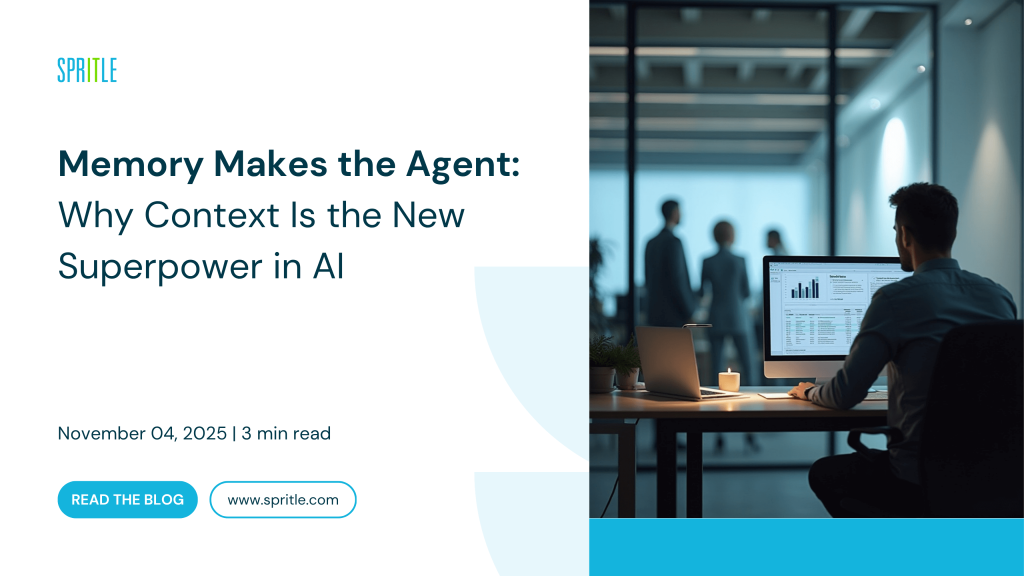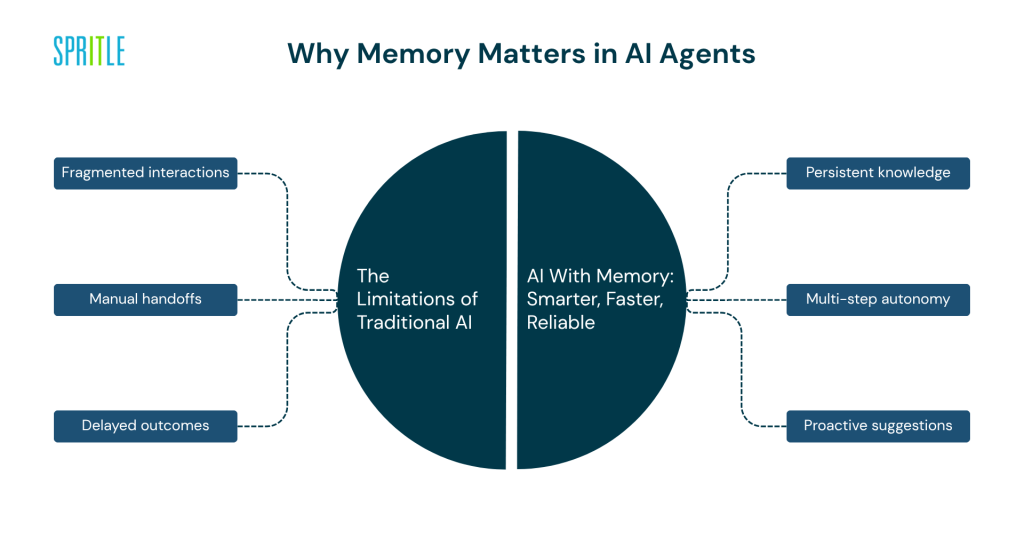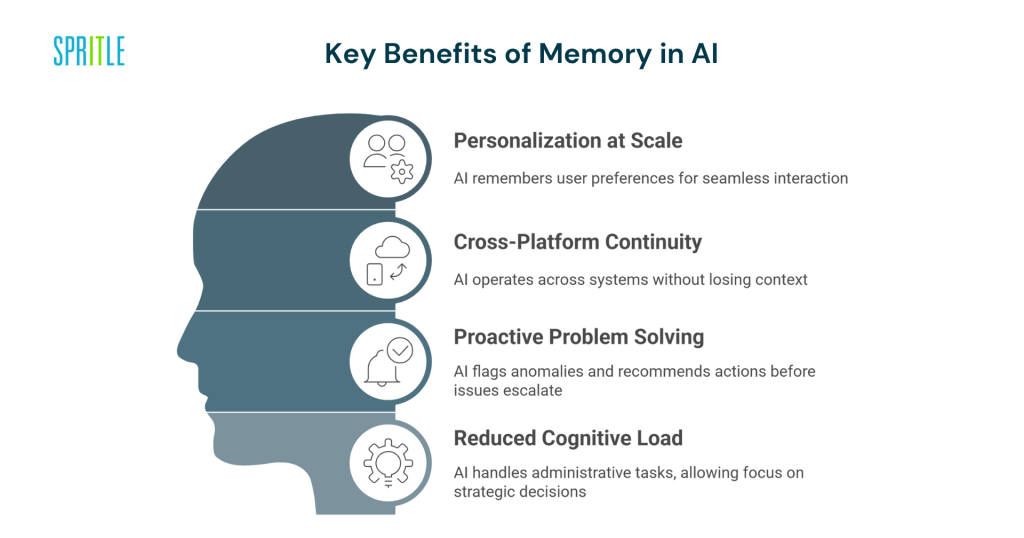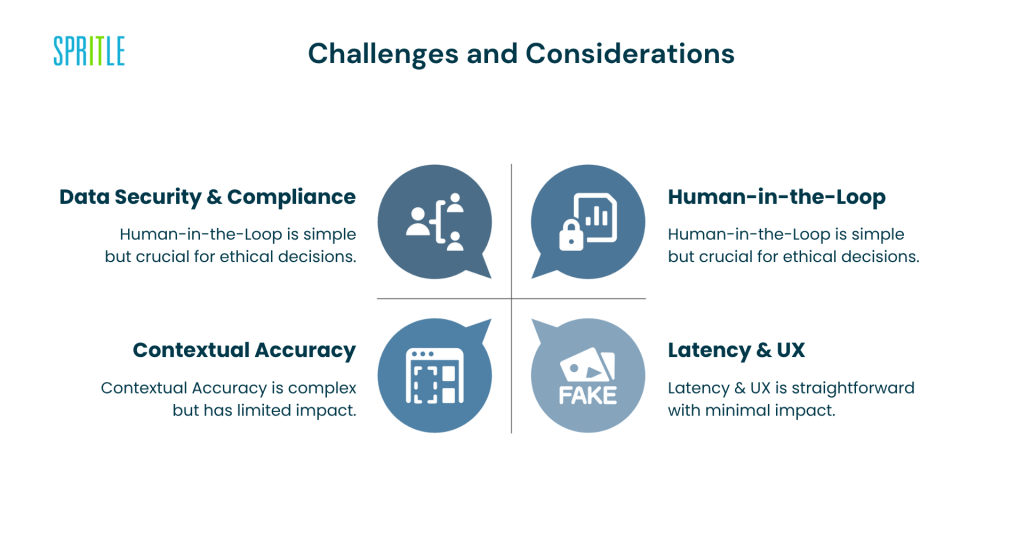
Imagine starting your day, opening a project dashboard, and asking your AI assistant:
“What happened with our churn last month? Which clients need follow-up?”
Instead of giving a blank stare or generic summary, your assistant instantly pulls the data, highlights anomalies, recalls last week’s team decisions, and suggests next steps. This isn’t science fiction—it’s the reality of memory-enabled Agentic AI.
For decades, AI tools were reactive. You prompted, they responded. Need a summary, a report, or an email draft? They delivered—but only momentarily. Every new task felt like starting from scratch. Context was lost. History was forgotten. Humans ended up orchestrating instead of strategizing.
Now, context is becoming the new superpower. Memory-enabled AI agents remember workflows, adapt to user preferences, and autonomously take action. For businesses, this is more than a productivity boost—it’s a competitive advantage.
Why Memory Matters in AI Agents
Traditional AI lacks the ability to retain context, which leads to:
- Fragmented interactions: Every query treated as isolated.
- Manual handoffs: Users repeat instructions across tools.
- Delayed outcomes: AI outputs sit in drafts instead of being executed.
Memory-enabled agents transform this landscape:
- Persistent knowledge: Recall project history, client interactions, and prior outputs.
- Multi-step autonomy: Plan, execute, and adapt tasks without repeated prompts.
- Proactive suggestions: Anticipate user needs and recommend actions before being asked.
Think of it like this:
- GenAI is a brilliant intern, able to respond but forgetful.
- Memory-enabled Agentic AI is a trusted teammate, able to execute and improve with experience.
Table: Traditional AI vs Memory-Enabled Agentic AI
| Feature | Traditional AI / GenAI | Memory-Enabled Agentic AI |
| Context Retention | ❌ Forgets past interactions | ✅ Remembers workflows, preferences, prior outputs |
| Task Execution | ✍️ Manual follow-ups needed | 🤖 Plans and executes multi-step tasks |
| System Integration | ❌ Disconnected from real systems | ✅ Connects to CRM, ERP, dashboards, APIs |
| Adaptability | ❌ Only responds reactively | ✅ Learns patterns and adapts over time |
| User Experience | ⚡ Momentary assistance | 🌟 Continuous, proactive collaboration |

Key Benefits of Memory in AI
1. Personalization at Scale
Memory allows AI to remember user preferences, communication styles, and project nuances. Teams no longer need to repeat instructions or reformat requests—it just works.
2. Cross-Platform Continuity
Agents can operate across multiple systems—Slack, Jira, CRMs, dashboards—without losing context, bridging gaps that normally require human coordination.
3. Proactive Problem Solving
Memory-enabled AI doesn’t just wait for commands. It flags anomalies, reminds stakeholders of deadlines, and recommends corrective actions before issues escalate.
4. Reduced Cognitive Load
With AI remembering context, employees focus on strategic decisions, not repetitive administrative work.
Table: Benefits Snapshot
| Benefit | Traditional Approach | Memory-Enabled Agentic AI |
| Report Generation | Hours/days | Minutes/hours |
| Meeting Prep | Manual consolidation | Automated alerts & summaries |
| Error Detection | Human review needed | AI flags anomalies in real-time |
| Employee Focus | Admin-heavy | Strategic, high-value work |

Real-World Use Cases
Fintech Operations
Weekly reports often involve consolidating data from multiple sources.
- GenAI approach: Generate summaries → Copy-paste into dashboards → Email team → Repeat.
- Memory-enabled AI: Pulls data → Generates summaries → Updates dashboards → Flags anomalies → Notifies stakeholders automatically.
Impact: Meetings reduced by 40%, reports ready in hours, and employees free for strategic tasks.
Healthcare & Clinical Documentation
Doctors and nurses spend hours documenting patient interactions.
- Without memory: Each encounter must be manually summarized.
- Memory-enabled AI: Remembers prior patient history, suggests notes, highlights anomalies, and pre-populates EHR fields.
Impact: Clinicians focus on patient care, errors decrease, and compliance is maintained.
SaaS Product Teams
Product managers often track feedback, feature requests, and KPIs.
- Without memory: Teams constantly re-query analytics tools.
- With memory: AI remembers project context, cross-references feedback, and proactively reports trends.
Impact: Faster decision-making, better prioritization, improved product delivery.
Table: Traditional Workflow vs Agentic AI Workflow
| Step | Traditional Workflow | Memory-Enabled Agentic AI Workflow |
| Data Collection | Manual aggregation | Automated, context-aware extraction |
| Analysis | Humans summarize | AI analyzes & flags trends |
| Reporting | Manual drafting | Auto-generates dashboards & alerts |
| Action | Humans assign tasks | AI creates tickets & notifications |
| Review | Manual QA | Human approves critical steps |
Challenges and Considerations
While memory is powerful, it’s not a silver bullet. Successful implementation requires:
- Data Security & Compliance: Especially in finance and healthcare, memory storage must be secure, auditable, and compliant (HIPAA, SOC 2, GDPR).
- Contextual Accuracy: Memory must be grounded to avoid AI hallucinations or misinterpretations.
- Human-in-the-Loop: Critical decisions still need human oversight for ethical and operational reasons.
Latency & UX: Memory retrieval should be seamless; slow responses reduce trust.

Future Outlook
The next wave of AI isn’t about better prompts or faster generation. It’s about autonomous, memory-enabled agents that:
- Connect seamlessly with business tools
- Proactively drive outcomes
- Reduce repetitive human tasks
- Scale knowledge across teams
By 2026, companies that leverage memory-first AI agents will have a significant productivity and decision-making advantage.
Takeaways for Leaders
- Memory is the differentiator: If your AI forgets, you’re stuck in prompt-land.
- Integration is key: Memory shines only when agents connect to real systems.
- Guardrails matter: Ethical, accurate, auditable memory ensures reliability.
- Outcome over output: AI must deliver results, not just outputs.
Memory transforms AI from a reactive tool into a strategic collaborator. Ready to see memory-enabled AI agents in action? Discover real-world applications and strategies with Spritle Software.
